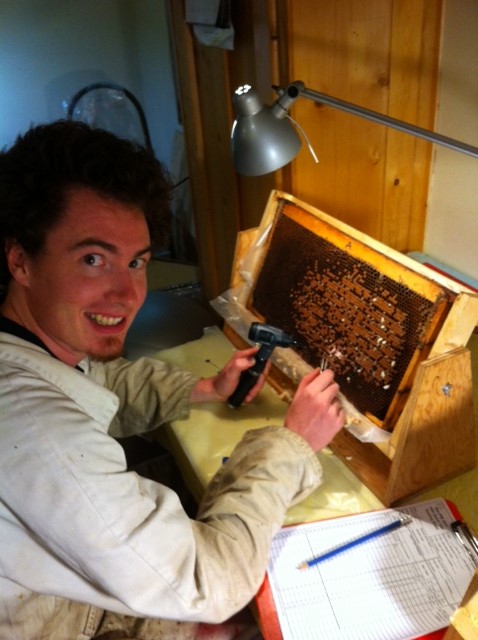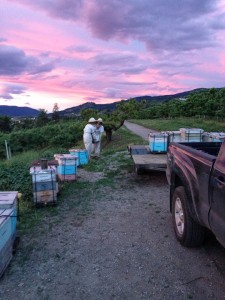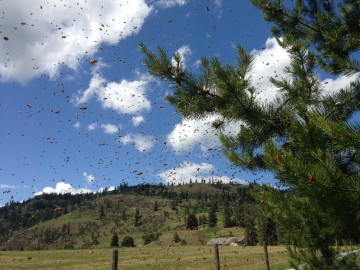
Max Macdonald
Max was genomics.entrepreneurship@UBC’s apicultural summer researcher over the summer of 2013. As the son of an experienced beekeeper and a current biochemistry student at UBC Okanagan, Max was the perfect candidate to work with the Next-Generation Integrated Pest Management Tools for Beekeeping (Bee IPM) project to obtain a qualitative and socioeconomic perspective on how beekeepers feel about the tools developed by the project researchers.
We asked Max a few questions about his exciting internship and here’s what he had to say:
What is your background with bees and how did you come across this internship?
Growing up on an apiary (bee farm), I gained experience from a young age in handling bees. As I grew to understand how important these pollinators are to our food security I became more interested in working with them from a career perspective. I soon realized that my growing experience in bee breeding could be very relevant to my love of genetics and biochemistry and when I met Dr. Leonard Foster, Bee IPM project leader, in Williams Lake at a bee meeting I knew this project with marker assisted selection (MAS) was something I wanted to be involved in.
Can you describe your internship?
As an IPM intern this summer, I had the to opportunity to connect with and interview a variety of beekeepers around British Columbia. I found this experience extremely valuable, as I was able to network with some very interesting people and gather the viewpoints and concerns of beekeepers in BC. The beekeepers I interviewed were mainly concentrated in the Okanagan-Shuswap and Vancouver Island areas while I was able to connect with some as far east as Cranbrook and as far north as Cecil Lake.
The main focus of my survey was to determine familiarity with selective breeding methods within the community while promoting the marker assisted selection (MAS) technique, field assisted selection (FAS) and the development of Varroa sensitive hygienic (VSH) stock. My sub-focus was gathering any major concerns BC beekeepers might have with breeding projects, the industry and colony health.
What did you learn from your interviews?
While the Varroa mite was a major concern beekeepers surveyed were greatly concerned with pressures on opening the US/Canadian border and the dangers of pests, disease, and resistant mite transmission if such trade were to be allowed. With the undersized inspection program in BC, and the recent explosion in hobbyist beekeeping, the allowance of package and nuc purchases from mainland US raised concerns for many.
Additional concerns expressed included loss of forage and native pollinator habitat to urbanization and pesticide use, as well as loss of nectar/pollen producing crops in some areas. Several beekeepers were concerned with a lack of mentoring programs within the industry and dedicated effort on bee research. They were also concerned that after this project and its imminent funding loss proper steps would not be taken to ensure effective use of what has been learned. There was great interest in the community that a dedicated bee lab be a secure entity in B.C. with ongoing research and training programs.
What did the beekeepers think of biotechnology tools to help the bee colonies?
All of the beekeepers with larger operations or ones focused on breeding were at least somewhat familiar with FAS for hygienic behavior and were very keen on the implications of MAS for VSH selection. It was the general opinion that FAS was too labour intensive and time consuming, thus making the MAS selection technique highly desirable. Hygienic behavior was regarded with less enthusiasm while VSH was seen as a profitable and important stock development.

Pollination drop off. (Photo: Max Macdonald)
What else did you do during your internship?
I learned and practiced a multitude of new skills pertaining to hygienic bee breeding including: Yard construction, grafting queens, catching, marking and clipping queens, queen banking, management of mating yards, field hygienic testing, and Varroa infestation setup and testing.
Over the summer, you also spent time with bee breeders Liz and Terry Huxter in Grand Forks. What was that experience like?
Working with Liz and Terry has been an extremely rewarding experience for me; their hospitality and patience with sharing their vast experience is greatly appreciated. Both Liz and Terry proved to be effective teachers and really took the time to make sure I understood every aspect of my work for them. Combined with Caitlin, their protégé, I could not have asked for a more effective and experienced team to work with this summer.
Any advice to future interns?
My advice to future IPM interns would be to be prepared to work hard for high reward and take every opportunity to connect with the community you can. Fitting interviews in with the busy schedule at camp Huxter can be tricky so be sure to designate some time for them early on. There are many more beekeepers in and out of province available for interview; perhaps an online questionnaire posted on beekeeping forums could produce more valuable insights into concerns, interests, and demographics of the community. Nearly all beekeepers I contacted for surveying were very conducive and happy to take the time to answer any questions I had of them.

Swarm in flight. (Photo: Max Macdonald)

